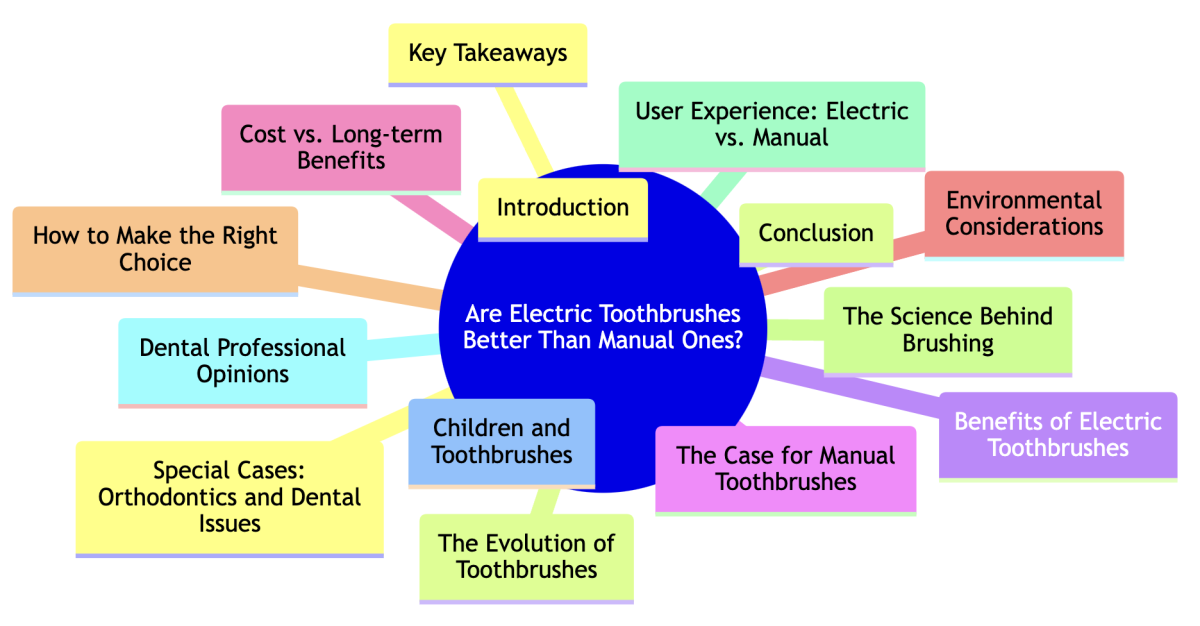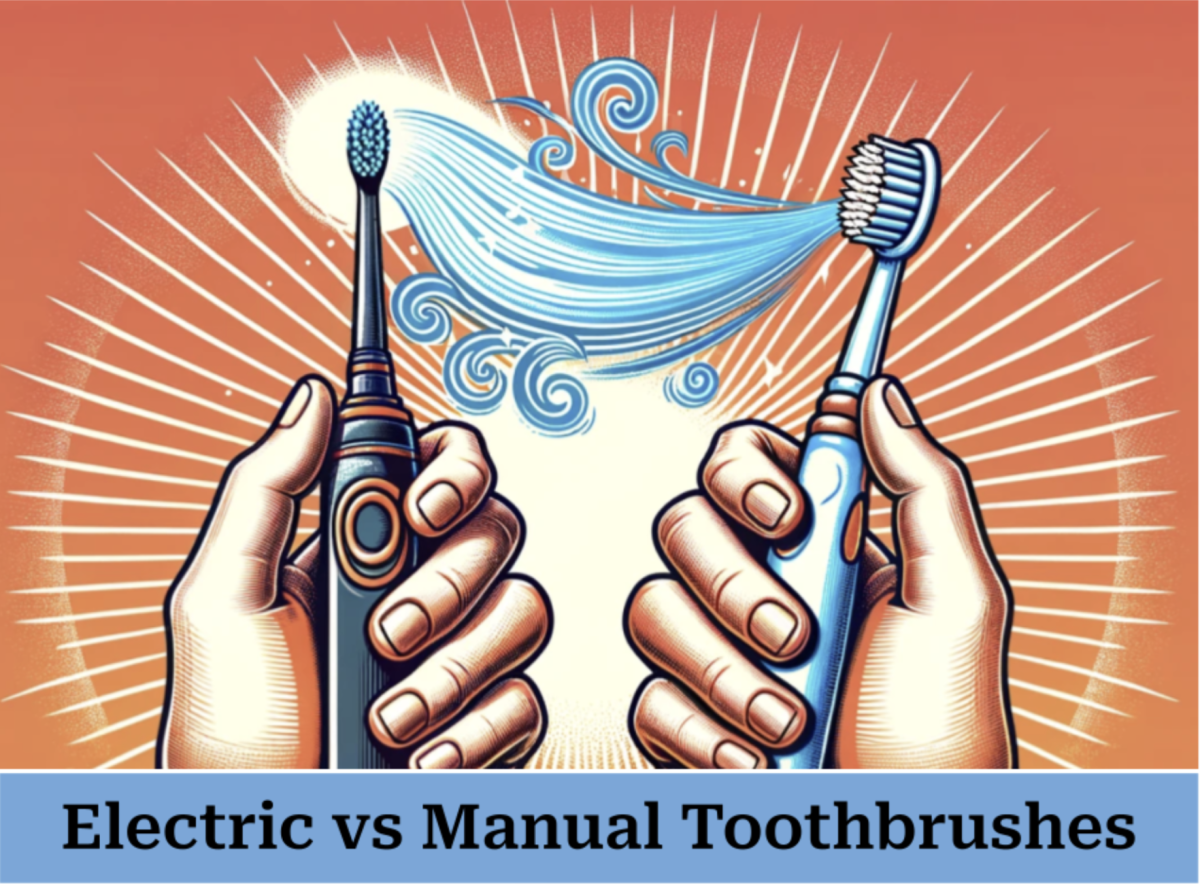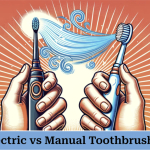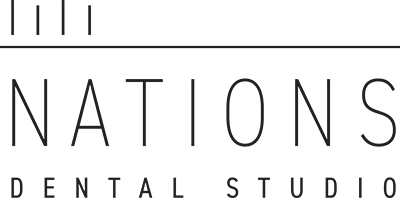So, you're standing in the toothbrush aisle, and you're faced with a dilemma: electric or manual?
It's not just a matter of what catches your eye or what's on sale this week. Your choice could improve your oral health.
Electric toothbrushes have been very popular in recent decades, boasting advanced features that promise a cleaner, healthier mouth.
But does that mean they're objectively better? This article examines the pros and cons of both, helping you make an informed decision about your pearly whites.
Remember, for the best Dentist Nashville, TN has to offer - Nations Dental Studio
Key Takeaways
- Electric Toothbrush Advantages: Electric toothbrushes come with a variety of features like timers, multiple brushing modes, and specialized brush heads.
- Manual Toothbrush Effectiveness: While they may lack advanced features, manual toothbrushes have their own set of advantages. Personal Needs and Comfort: The ideal toothbrush is not universal; it varies from person to person based on individual needs, comfort levels, and even lifestyle.
- Cost Considerations: Electric toothbrushes often come with a higher initial cost. However, the long-term benefits, such as potentially fewer dental issues, could make it a worthwhile investment.
- Environmental Factors: Electric toothbrushes often allow you to replace only the brush head, reducing plastic waste.

Benefits of Electric Toothbrushes
Advanced Features for Targeted Cleaning
Electric toothbrushes come with many features designed to make your oral care routine more effective. From built-in timers that ensure you brush for the dentist-recommended two minutes to pressure sensors that prevent you from brushing too hard, these advanced features are engineered for targeted cleaning.
Key Features:
- Timers: Most electric toothbrushes come with a built-in timer that vibrates or beeps to let you know when you've brushed for the recommended two minutes.
- Multiple Modes: Whether you're looking to whiten your teeth, focus on gum health, or remove plaque, electric toothbrushes often have multiple modes to cater to specific needs.
- Pressure Sensors: These sensors alert you if you're brushing too hard, helping to prevent gum damage.
- Bluetooth Connectivity: Some advanced models offer Bluetooth connectivity to sync with your smartphone, providing real-time feedback and tracking your brushing habits.
- UV Sanitizer: Certain electric toothbrushes come with a UV sanitizer built into the charging base, which can kill up to 99.9% of bacteria and germs on the brush head.
Specialized Brush Heads
A Closer Look at Your Options
When it comes to electric toothbrushes, one of the most compelling features is the wide array of specialized brush heads available. These are not just bristles on a stick; they're engineered for specific oral care needs, making your brushing experience highly customized.
Types of Brush Heads:
- Sensitive: Ideal for those with sensitive teeth or gums, these brush heads feature softer bristles that provide a gentle yet effective clean.
- Whitening: These brush heads are designed with special bristle configurations to remove surface stains and help you achieve a brighter smile.
- Floss Action: Equipped with MicroPulse bristles, these brush heads offer superior interdental cleaning, getting between teeth to remove plaque where regular bristles might not reach.
- Orthodontic: Specifically designed for those with braces or other orthodontic appliances, these brush heads have bristles arranged to effectively clean around wires and brackets.
- Tongue Cleaner: Some brush heads come with a built-in tongue cleaner on the reverse side, allowing you to maintain complete oral hygiene without needing a separate tool.
User-Friendly for All Ages
Electric toothbrushes are often considered more user-friendly, especially for children and the elderly. The automated movements require less manual dexterity, making it easier for people who may struggle with the fine motor skills needed for effective manual brushing.
User-Friendly Features:
- Automated Movements: Takes the guesswork out of brushing
- Easy Grip Handles: Designed for comfortable holding
- Visual Indicators: Some models offer visual indicators to guide you through a thorough brushing routine
Manual Toothbrushes: Can They Be Just As Good?
Simplicity and Control
The primary advantage of manual toothbrushes lies in their simplicity. They don't require batteries or charging, making them a convenient option for travel. Additionally, they offer more control over the brushing pressure and technique.
Advantages of Simplicity:
- No Batteries Required: Makes it generally more convenient and travel-friendly
- More Control: Allows you to adjust brushing pressure and technique
- Cost-Effective: Generally cheaper than electric options
Technique Matters
While manual toothbrushes may not boast the high-tech features of their electric counterparts, the effectiveness of your brushing largely depends on your technique. Mastering the right brushing methods can make a manual toothbrush just as effective for maintaining your oral health.
-
Circular Motions
Using circular motions rather than back-and-forth strokes can be more effective for plaque removal. This technique is gentler on your gums and provides a more thorough clean.
-
Two-Minute Rule
The American Dental Association recommends brushing for at least two minutes to achieve optimal results. This ensures that you give adequate attention to all areas of your mouth.
-
Don't Forget the Tongue
Your tongue can harbor bacteria that contribute to bad breath and plaque buildup. Make it a habit to gently brush your tongue every time you brush your teeth.
-
Angle Matters
Holding your toothbrush at a 45-degree angle to your gums can improve the effectiveness of plaque removal. This angle allows the bristles to get under the gumline, providing a deeper clean.
-
Use the Right Amount of Pressure
Applying too much pressure while brushing can lead to gum recession and enamel wear. A lighter touch is generally more effective and less damaging to oral health.
Long-term Benefits of Correct Brushing
When it comes to oral care, the benefits of effective brushing extend far beyond a fresh feeling and a bright smile. Here are some of the long-term advantages you can expect:
-
Effective Plaque Removal
Consistent and effective plaque removal can significantly reduce the risk of developing cavities over time.
-
Gum Health
Proper brushing techniques and regular dental care can lower the risk of gum disease, which has been linked to other health issues, such as heart disease.
-
Overall Oral Hygiene
Maintaining a clean and healthy mouth is good for your teeth, and it can also positively impact your overall health, including better digestive function and a stronger immune system.
-
Fresher Breath
Regular and effective brushing, along with flossing and tongue cleaning, can help you maintain fresher breath, boosting your confidence in social situations.
-
Lower Healthcare Costs
Good oral hygiene practices can lead to fewer dental issues, which in turn can result in lower healthcare costs over the long term, saving you money.
How to Choose the Right Toothbrush for You
Assess Your Needs
The ideal toothbrush varies from person to person and depends on individual needs, comfort levels, and lifestyle. Here are some factors to consider:
Factors to Consider:
- Oral Health Needs: Do you have sensitive teeth, or gum issues, or are you prone to cavities?
- Lifestyle: Are you a frequent traveler? Do you prefer a simple or tech-savvy routine?
- Budget: What are you willing to invest in your oral health?
Consult Your Dentist
Your dentist can provide personalized advice based on your oral health status. It's always a good idea to consult with them before making a decision.
Questions to Ask Your Dentist:
- Is an electric toothbrush necessary for my oral condition?
- What type of bristles would be best for me?
- Any specific brands or models you recommend?
Maintenance Tips for Both Types
Taking good care of your toothbrush, whether it's manual or electric, is crucial for effective oral hygiene. Here are some key maintenance tips to follow:
-
Regular Replacement
It's recommended by dentists to replace your toothbrush or brush head every three to four months, or sooner if the bristles are frayed.
-
Rinse Thoroughly
After each use, make sure to rinse your toothbrush thoroughly to remove any remaining toothpaste and debris.
-
Proper Storage
Always store your toothbrush in an upright position and allow it to air-dry. This helps prevent the growth of bacteria.
-
Avoid Sharing
Never share your toothbrush with anyone, even family members, as this can lead to cross-contamination of germs and bacteria.
-
Disinfect Occasionally
It's a good practice to disinfect your toothbrush periodically. You can soak it in an antiseptic mouthwash or boil it in water for about three minutes to kill most germs.
Durability and Longevity
While manual toothbrushes are generally less durable due to their disposable nature, electric toothbrushes are designed to last longer, especially those from reputable brands.
Durability Factors:
- Material Quality: Higher-end electric toothbrushes are often made with more durable materials.
- Warranty: Many electric toothbrushes come with warranties, offering peace of mind.
- Battery Life: The longevity of the battery can be a determining factor in the overall durability of an electric toothbrush.
Wrapping Up
Choosing between an electric and a manual toothbrush involves various factors, including effectiveness, cost, ease of use, and even environmental impact. This comprehensive guide aims to arm you with the knowledge you need to make an informed decision that aligns with your lifestyle and oral health needs. Remember, the best toothbrush is the one that you will use correctly and consistently. For more insights on general and cosmetic dentistry, Nations Dental Studio

























